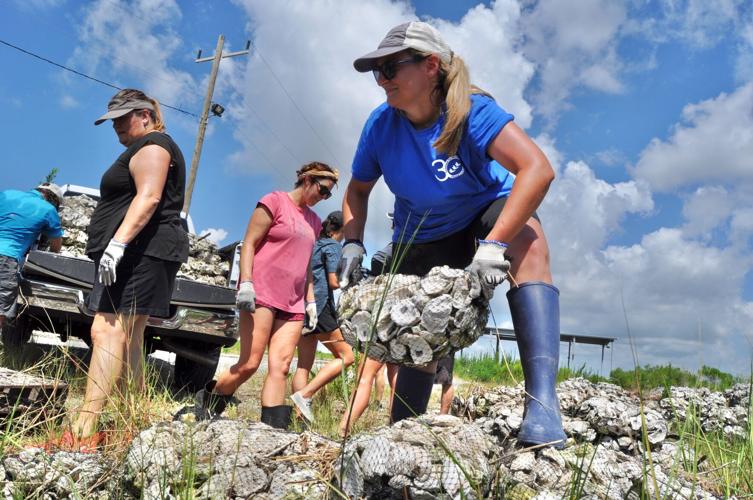Louisiana's insatiable appetite for oysters produces a lot of shells. But rather than go back to the coast, most of the shells from local restaurants go straight to the dump.
A new tax credit aims to reverse this trend. Signed into law by Gov. John Bel Edwards last week, the measure will give restaurants a $1 credit for every 50 pounds of shell donated to an oyster shell recycling program.
“We’re trashing an extremely large amount of oyster shells that can serve a secondary purpose,” said state Rep. Mandie Landry, D-New Orleans, who sponsored the measure under House Bill 255.

Devon Augustine, who has been shucking oysters at Pêche restaurant for seven years in the Warehouse District of New Orleans, tosses a shell into a bin on Thursday, Jan. 7, 2021. The restaurant is participates in an oyster shell recycling program.
Recycled shells are used to build bulwarks against waves, storms and rising seas — factors that contribute to the state’s rapid loss of land. The reefs also foster the growth of new oysters and provide habitat and food for fish, crabs and other marine animals.
The state’s only large-scale shell recycling program has returned 13 million pounds of shells to the water since 2014. Run by the Coalition to Restore Coastal Louisiana, the program could get a substantial boost from the measure.
“This bill should make it possible for more restaurants to do the right thing without jeopardizing their bottom line,” said Tyler Bosworth, CRCL’s advocacy director.

Oysters harvested from Grand Isle, Alabama, Alaska and Prince Edward's Island share a platter at Le Chat Noir, the new restaurant in a former cabaret space in downtown New Orleans. (Staff photo by Ian McNulty, Nola.com | The Times Picayune)
The measure garnered unanimous support from the Senate and House of Representatives. It was also backed by several environmental groups, the Louisiana Restaurant Association and the Louisiana Hotel and Lodging Association.
The CRCL recycling program has 29 participating restaurants in New Orleans and Metairie. Most are large restaurants that can afford the monthly $55 per-bin pickup fee. The tax credit will help smaller restaurants take part, said Darrah Bach, the recycling program’s coordinator.
“We’re really hoping this credit inspires others to participate, especially family-run businesses,” she said.
The fees CRCL charges cover shell pickups several times a week and transport to a site in St. Bernard Parish where the shells are allowed to cure in the sun for a year. Volunteers then pack the shells in biodegradable mesh bags for us on reef projects.

Mark Gagliano of Coastal Environments uses a crane to lift gabion cages full of recycled oyster shells into Barataria Bay in August 2020. The shells were used to build a reef that will improve habitat and slow coastal erosion. (Photo by Tristan Baurick, The Times-Picayune | The New Orleans Advocate)
CRCL has used shells to build about 8,000 feet of oyster reef in five parishes. The group plans to build its sixth reef this fall.
The group has focused much of their recent efforts on protecting Native American mounds and cemeteries.
A reef protecting a mound south of Montegut has weathered several storms.
“When (Hurricane) Ida hit, we came back and the oyster shells were still there,” said Christine Verdin, a member of the Pointe-au-Chien Indian Tribe.
Dinner cast-asides are packed in bags, cages as bulwark against waves, storms, rising seas
Mid-Barataria project seen to create 27 square miles of land, displace brown shrimp and oysters
For days after Hurricane Ida, Chandra Straw’s New Orleans neighborhood was choked by waves of thick, black smoke. She stopped going outside, p…





























